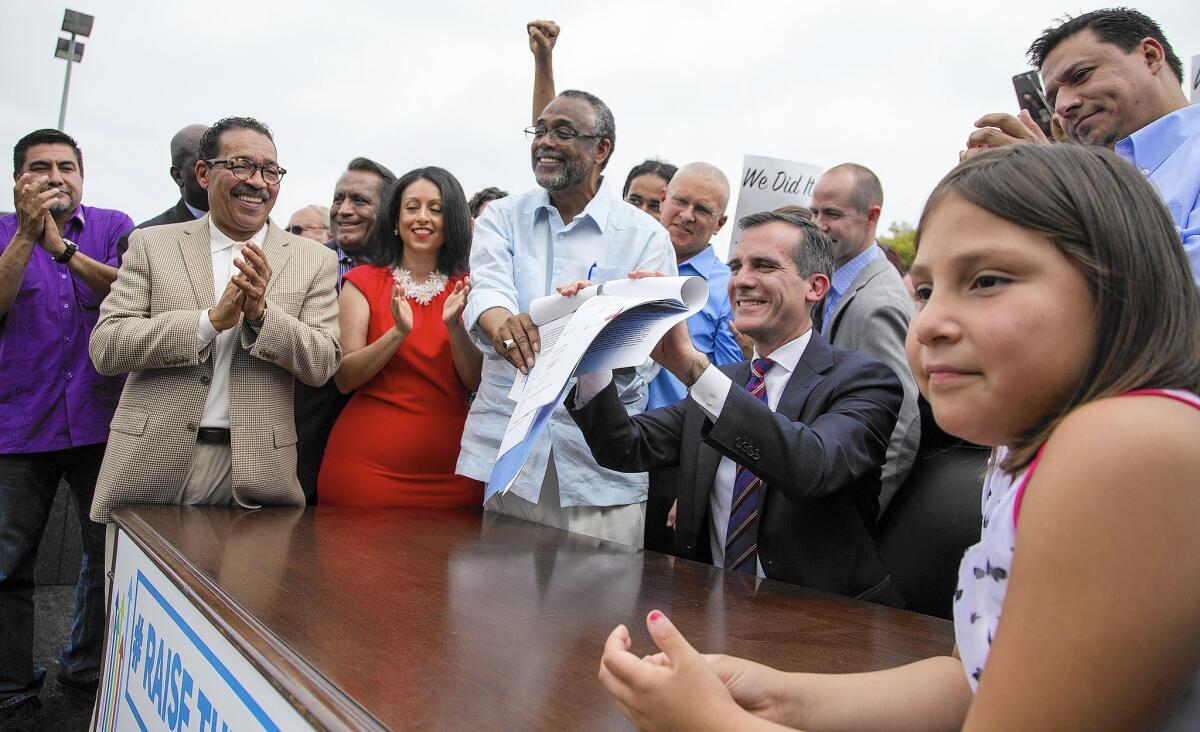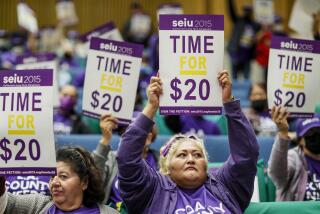First & Spring: Labor leaders’ credibility slips in minimum-wage debate

L.A.’s decision to boost the minimum wage should have been the sweetest of victories for organized labor.
Mayor Eric Garcetti helped union leaders and their allies achieve a long-sought goal Saturday, signing an ordinance that moves the city’s hourly minimum to $15 by 2020.
But for some partisans on each side of the debate, that historic moment has been tainted by labor leaders’ last-minute push for an exemption for unionized workplaces. The request for a union waiver — proposed and then abruptly shelved — drew national attention, much of it negative, to the county Federation of Labor and its recently installed top executive, Rusty Hicks.
When Hicks and his allies advocated for the increase, “they basically said everybody who works in Los Angeles is entitled to $15 an hour — that that’s the minimum people should be paid so they can pay rent and support their families,” said lobbyist Steve Afriat, who bucked other business officials by endorsing a $15 minimum wage last fall. “And then … they hardly take a break before they say, ‘We want our members exempt from it.’”
That request hurt the credibility of union leaders, Afriat said, particularly among L.A. leaders who are not their “knee-jerk” supporters. Other assessments were similarly harsh.
Political analyst Harold Meyerson, an expert on organized labor, called Hicks’ handling of the proposal a “self-inflicted disaster” in an op-ed in The Times. The gossip site Gawker outright mocked backers of the idea.
And USA Today’s editorial page said the opt-out clause showed labor was looking to use the minimum wage increase as “a weapon to pressure companies to unionize,” since unionized companies would then have the ability to negotiate a subminimum wage.
Hicks said he broached the idea of an exemption to the citywide minimum wage last month, in phone calls to staffers with City Council President Herb Wesson and Councilman Curren Price. Those calls took place after the council had backed a plan for raising the wage but before its vote on the specific language. Once the information got out, spurring a backlash, Hicks held a news conference to explain that city leaders would take additional time to study the idea.
Wesson is now planning a discussion of the issue this fall. But others say labor leaders might have done better to let the idea die a swift and public death.
By keeping the proposal alive, labor officials have reopened the debate over whether other employers — such as small businesses and nonprofits — should have their own exemptions, said Tim McOsker, an attorney who represented restaurants on the wage proposal. Union officials will also remain vulnerable to accusations of hypocrisy — that they fought to keep other employers from getting exceptions from the law while seeking one for themselves, he said.
“It’s harmful to them” to have the conversation continue, McOsker said. “They would have been better off losing quickly.”
Hicks, during an interview with The Times, declined to discuss the opt-out proposal, saying instead that passage of the wage law is an undisputed win. “The fact that 750,000 workers are going to see a raise as a result of this is a huge victory,” he said.
The labor leader would not say whether additional debate on the exemption could harm his organization. “My statement is my statement,” he said.
Backers of the carve-out have repeatedly pointed out that exemption language can be found in other L.A. wage ordinances. For example, a recently approved law increasing the minimum wage at L.A.’s large hotels lets unionized workers waive the wage requirement through the process of “collective bargaining,” which would allow them to sign off on an overall package of salaries and benefits.
Backers of the carve-out for collective bargaining describe it as a common sense approach to employee negotiations. The point, they say, is to let unionized workers determine their overall salary package, which could allow them to agree to a lower hourly wage in exchange for other benefits, such as healthcare coverage or extra days off.
Business leaders took a “morally logical” idea — ensuring that workers have a voice on their contracts — and portrayed it as an effort by unions to avoid compliance with a higher wage, said Nelson Lichtenstein, director of UC Santa Barbara’s Center for the Study of Work, Labor and Democracy.
“Opponents were looking for a way to tarnish it — and I think they did,” he said.
Still, business groups were not the only ones speaking out. Los Angeles city employee Art Sweatman, a longtime activist with Service Employees International Union Local 721, took to Twitter last month to denounce the proposal, saying he “vomited” after learning about the labor federation’s involvement.
“This [ordinance] is about raising the minimum wage for all workers, union and non-union. So for them to say private union shops would be exempted is a real slap in the face,” said Sweatman, who emphasized that he was not speaking on behalf of his SEIU chapter.
Garcetti, who proposed a higher minimum wage last fall, now opposes a union exemption, saying through a spokesman last week that “nobody should be paid below minimum wage.” And Councilman Mike Bonin, one of labor’s closest council allies, recently told an audience that the very idea of a carve-out took him by surprise.
“I don’t support that exemption,” said Bonin, appearing at the Los Angeles Current Affairs Forum. “And I won’t support that exemption unless it’s something the city attorney tells me point-blank that we absolutely need to have in this ordinance.”
Some expect the controversy to be short-lived. Goetz Wolff, a lecturer at UCLA’s Luskin School of Public Affairs, said organized labor experienced a “temporary setback,” one triggered by a lack of public understanding of how bargaining and union contracts work. Dan Schnur, director of USC’s Jesse M. Unruh Institute of Politics, said much of the uproar on the council revolved around the fact that they felt “sandbagged” by the request so late in the deliberations.
For labor leaders, “the most likely outcome here is that they either move on to another objective or come back to this one once the heat is off,” he said.
Critics of the opt-out language predict it will be a hard sell both in Los Angeles and other cities. A union carve-out, they argue, will leave the public with the impression that the fight for a higher wage was really about boosting union membership and securing lucrative union dues.
An opt-out provision for union workplaces will only bolster the idea that labor leaders “don’t necessarily have the interests of workers in mind,” said University of Rhode Island assistant professor Erik Loomis, who specializes in labor and environmental history.
“All it really does,” he said, “is reinforce the idea that unions aren’t in it for the everyday worker, they’re in it for themselves.”
Twitter: @davidzahniser
Twitter: @LATimesemily
More to Read
Sign up for Essential California
The most important California stories and recommendations in your inbox every morning.
You may occasionally receive promotional content from the Los Angeles Times.








